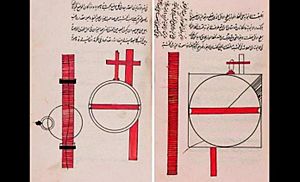Al-Karaji facts for kids
Quick facts for kids
Abū Bakr al-Karajī
|
|
|---|---|

Diagrams from Al-Karaji's work on "hidden waters"
|
|
| Born | 953 |
| Died | 1029 (aged 75–76) |
| Nationality | Persian |
|
Main interests
|
Mathematics, Engineering |
|
Influences
|
|
Abū Bakr Muḥammad ibn al Ḥasan al-Karajī (Persian: ابو بکر محمد بن الحسن الکرجی; c. 953 – c. 1029) was a brilliant Persian mathematician and engineer. He lived a long time ago, from about 953 to 1029. He was born in a city called Karaj, which is near Tehran in modern-day Iran. Al-Karajī did much of his important work in Baghdad.
He wrote several books about math. Three of his most famous books are Al-Badi' fi'l-hisab (meaning Wonderful on calculation), Al-Fakhri fi'l-jabr wa'l-muqabala (meaning Glorious on algebra), and Al-Kafi fi'l-hisab (meaning Sufficient on calculation). These books covered important topics like calculation and algebra.
Contents
Al-Karajī's Discoveries
Al-Karajī made many important contributions to mathematics and engineering. While some of his ideas built on the work of others, like Diophantus, many historians believe he was very original. He helped algebra become its own field, separate from geometry.
Algebra and Exponents
Al-Karajī studied the rules of algebra very carefully. He worked with polynomials, which are math expressions with variables and exponents. He showed how to add, subtract, and multiply these polynomials.
He was also the first to understand exponents in a new way. He realized that a sequence like x, x², x³, and so on, could go on forever. He also looked at their opposites, like 1/x, 1/x², and 1/x³. This was a big step in understanding how numbers and powers work.
Pascal's Triangle and Binomial Theorem
Al-Karajī was the first to describe what we now call Pascal's triangle. This is a special triangle of numbers where each number is the sum of the two numbers directly above it. It's used to find binomial coefficients, which are numbers that appear when you expand expressions like (a + b) to a certain power.
He is also given credit for discovering the binomial theorem. This theorem provides a quick way to expand expressions like (a + b) raised to any power, without having to multiply them out many times.
Mathematical Induction
Al-Karajī also introduced an important idea called mathematical induction. This is a way to prove that a statement is true for all numbers. It works by showing that if the statement is true for one number, it must also be true for the next number.
He used this method to prove a formula for adding up the cubes of numbers (like 1³ + 2³ + 3³...). Even though his proof was for a specific number, the method he used could be applied to any number. This was a very early example of this powerful proof technique.
Engineering and Hydrology
Al-Karajī also wrote a book called "Extraction of Hidden Waters." In this book, he talked about the basic principles of hydrology. Hydrology is the study of how water moves on and under the Earth's surface. This book shows that he had a deep understanding of water science. It is considered the oldest surviving text in this field.
In this book, he also mentioned that the Earth is round, or spherical. He believed it was the center of the universe, which was a common idea at the time.
See also
 In Spanish: Al-Karaŷí para niños
In Spanish: Al-Karaŷí para niños
 | Frances Mary Albrier |
 | Whitney Young |
 | Muhammad Ali |

